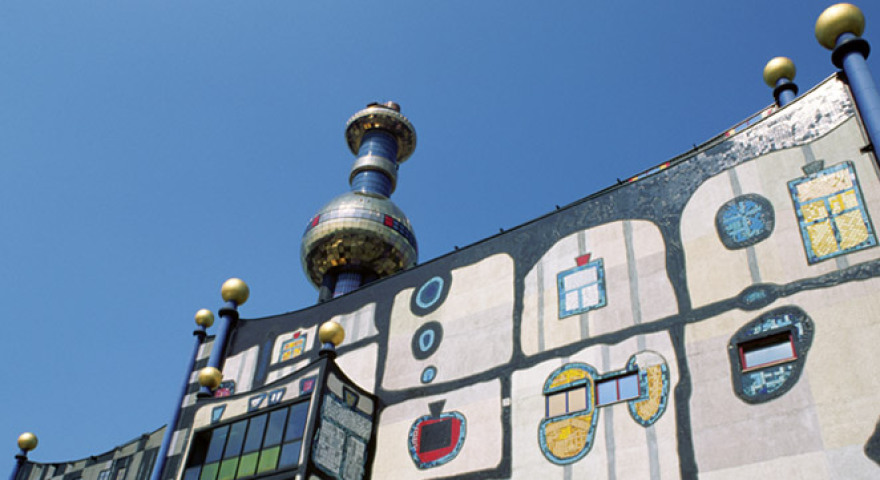
Recycled plastic is fashion-forward
Prizes go to waste!
Epro, the European association that promotes plastics recycling and recovery, recently honoured the Italian firm Filatura di Saluzzo’s Newlife polyester fibre with its 2012 “best recycled product” award. Spun from bottles, this new range of recycled polyester fibre matches, in performance and quality, the virgin polyester fibres normally used in the market. The new fibre has remarkable features – it is not just highly resistant, but also breathable, anti-UV, anti-mould and more. Another innovation is that it can be dyed in the spinning phase to save water. Top Italian fashion designers are already using it, bringing recycled plastic into the elegant world of haute couture fashion.

Giorgio Armani has already used this fibre in a bespoke gown for Livia Firth, wife of Colin Firth and queen of upcycling. Both were prominent red-carpet guests at the 2012 Golden Globes awards. Livia Firth is co-founder of the Green Carpet Challenge which aims to encourage stars into wearing eco-friendly clothes. Chanel, Tom Ford, Stella McCartney and Valentino have expressed keen interest in Newlife which is both ecological and silky soft to wear.
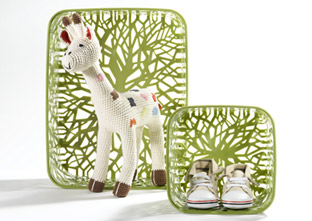 In the BtoC (Business-to-Consumers) category, the Dutch firm Curver stood out for its EcoLife Neo range of table baskets made of 100% recycled household plastics. Curver has shown how to blend ambitious design and modernity with a focus on recycled plastics and hence, the environment.
In the BtoC (Business-to-Consumers) category, the Dutch firm Curver stood out for its EcoLife Neo range of table baskets made of 100% recycled household plastics. Curver has shown how to blend ambitious design and modernity with a focus on recycled plastics and hence, the environment.
Creators at his feet
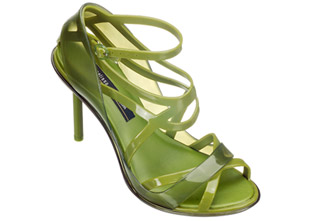 Still little-known in Europe but creating a real fashion buzz at home, Brazilian footwear brand Melissa has carved out a niche in "all plastic" footwear. Nothing new there, you might think. But you’d be wrong! This brand’s sideways take was to make them out of recycled PVC - a costly investment which meant designing machines able to inject the material. Over the years, the label has won over big-name designers to create funky new footwear bringing Jean Paul Gaultier, Thierry Mugler, Vivienne Westwood and Zaha Hadid on-board to the delight of fashionistas.
Still little-known in Europe but creating a real fashion buzz at home, Brazilian footwear brand Melissa has carved out a niche in "all plastic" footwear. Nothing new there, you might think. But you’d be wrong! This brand’s sideways take was to make them out of recycled PVC - a costly investment which meant designing machines able to inject the material. Over the years, the label has won over big-name designers to create funky new footwear bringing Jean Paul Gaultier, Thierry Mugler, Vivienne Westwood and Zaha Hadid on-board to the delight of fashionistas.
Generous curves a gourmet’s delight
Another award winner in 2011 was Tefal with its Enjoy line of cookware – a range of ladles and spatulas made of 95% recycled material (Epro’s required minimum is 50%) and, a major plus, made in Europe. Before embarking on the venture, Tefal did a comparative life-cycle assessment (LCA) between recycled PET and standard material (polyamide) for manufacturing its kitchen tools. Recycled PET halves the carbon footprint of kitchen tools made from it. A spatula can be made from just two PET bottles! The statement design is also lovingly crafted as a play of almost body-defining sensual curves.
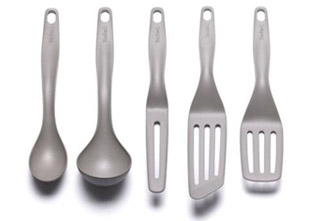
Bag it – don’t bin it
 Top fashion house Yves Saint Laurent has pushed the sustainable development envelope with a limited series of tote bags made of recycled plastic bags and fair-trade cotton. The "Muse Two Artisanal" may be put together in the luxury brand’s own workshops, but the material is woven by women artisans of the Gafreh association in Burkina Faso. The craftsmanship of these women using recycled plastic bags combined with the unparalleled expertise of Yves Saint Laurent is an attention-grabbing combination.
Top fashion house Yves Saint Laurent has pushed the sustainable development envelope with a limited series of tote bags made of recycled plastic bags and fair-trade cotton. The "Muse Two Artisanal" may be put together in the luxury brand’s own workshops, but the material is woven by women artisans of the Gafreh association in Burkina Faso. The craftsmanship of these women using recycled plastic bags combined with the unparalleled expertise of Yves Saint Laurent is an attention-grabbing combination.
Fountain pen hits the heights
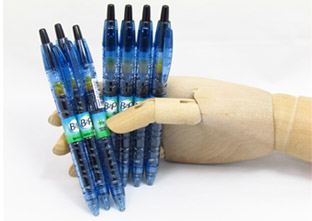 It has been through many world leaders’ hands...as you would expect, having been appointed the official pen for the last climate change summit in Copenhagen. “It” is the Pilot B2P pen: B2P signifying Bottle to Pen. 89% composed of recycled materials, the B2P is also made of pellets from shredded and ground used plastic bottles. A European, and now global, phenomenon, the B2P has sold over six million units. The idea for the B2P came from Pilot’s assessment of its environmental impact through a product life-cycle assessment. It found that the clear, critical step was the choice of raw materials, because a fountain pen is not polluting in use. It therefore decided to cut down on virgin raw materials in favour of more recycled ones.
It has been through many world leaders’ hands...as you would expect, having been appointed the official pen for the last climate change summit in Copenhagen. “It” is the Pilot B2P pen: B2P signifying Bottle to Pen. 89% composed of recycled materials, the B2P is also made of pellets from shredded and ground used plastic bottles. A European, and now global, phenomenon, the B2P has sold over six million units. The idea for the B2P came from Pilot’s assessment of its environmental impact through a product life-cycle assessment. It found that the clear, critical step was the choice of raw materials, because a fountain pen is not polluting in use. It therefore decided to cut down on virgin raw materials in favour of more recycled ones.
Computers are green to go
Sony scored first on the highly-prized laptop market with its VAIO series. Close to 80% of the plastic parts: top cover, palm rest and bottom case, are made from recycled plastic. Also, the screen has a much more energy-efficient LED backlight. As a finishing touch, the outer fabric of the carrying case supplied with the netbook is of 100% recycled polyester. Sony claims to have cut its CO2 emissions by 10% compared to a conventional model. Staying with the ecological theme, solar panels should gradually start featuring in many laptops to save on traditional battery use. And mobile phones are going down the same route.

A DVD with your coffee-maker?
 Coffee-makers are another area where the style stakes are high! And Philips could have stayed stuck at producing design-savvy coffee-makers that, well, make good coffee, but it didn’t. With resource husbanding in mind, its design engineers came up with the Senseo Viva Eco Café - a machine whose basic materials come from discarded electronics equipment. All of its plastic parts - except those in contact with the water and coffee, are made from recycled plastics. The wave-textured lid cover was made from recycled CDs and DVDs, whose plastic substrates could be laser-engraved in the mould.
Coffee-makers are another area where the style stakes are high! And Philips could have stayed stuck at producing design-savvy coffee-makers that, well, make good coffee, but it didn’t. With resource husbanding in mind, its design engineers came up with the Senseo Viva Eco Café - a machine whose basic materials come from discarded electronics equipment. All of its plastic parts - except those in contact with the water and coffee, are made from recycled plastics. The wave-textured lid cover was made from recycled CDs and DVDs, whose plastic substrates could be laser-engraved in the mould.





